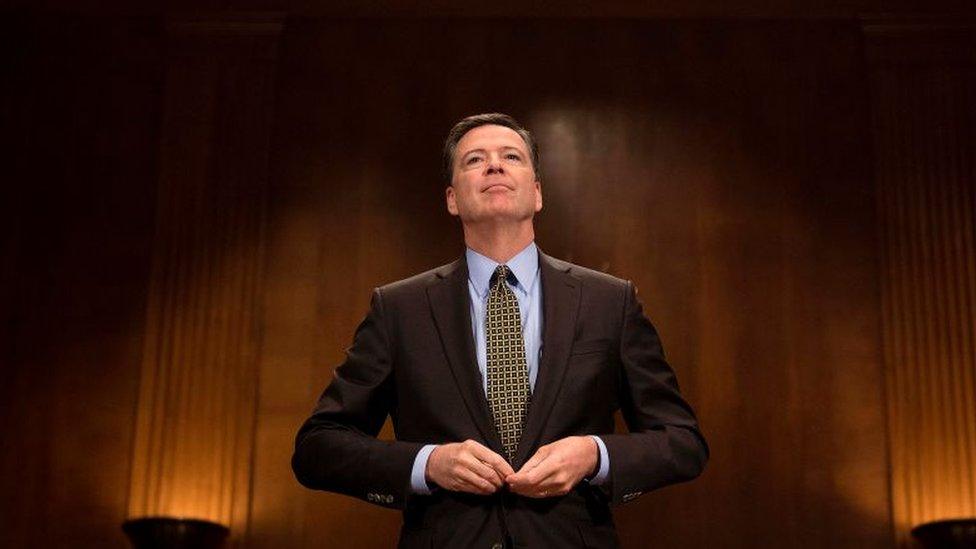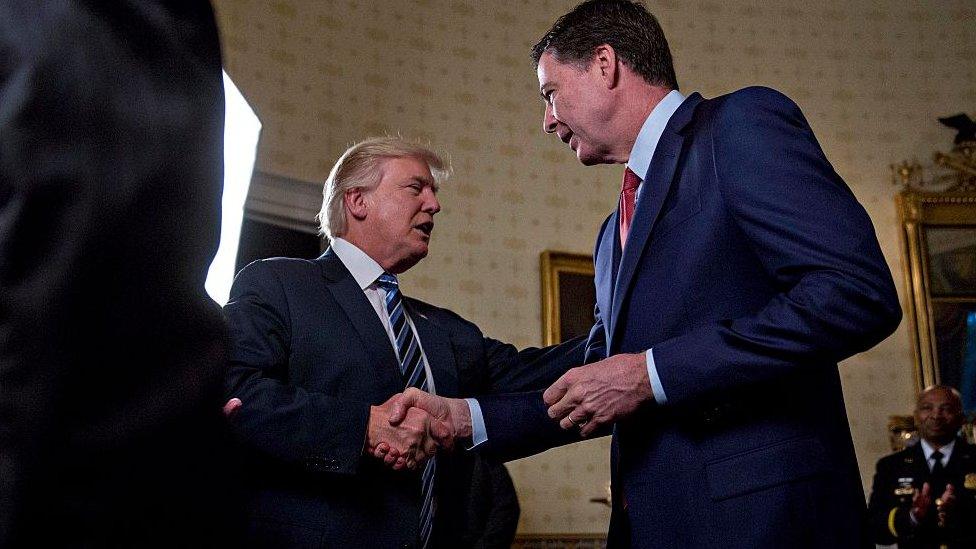Seven questions for ex-FBI chief James Comey at Congress
- Published

When former FBI Director James Comey testifies on Thursday before a Senate committee for the first time since being fired by President Donald Trump in May, it quite possibly will be the biggest piece of political theatre the nation's capital has seen in a generation.
The city is going to grind to a halt to observe the spectacle. Local bars are opening early to host viewing parties. Democrats and Republicans will be united in rapt attention as the former director has his first opportunity to publicly give his account of his interactions with the president and the circumstances of his dismissal.
Oh, and don't forget - after Mr Comey's public testimony, he'll be answering more sensitive questions from senators in a private hearing. If there are any shocking revelations that come out, their chances of not leaking to the media are just about zero.
Here's a look at the most pressing questions Mr Comey will face during his appearance - and what we can expect from his answers.

Did the president pressure you to back off of the Michael Flynn investigation?
In a morning of big questions, this will be the biggest. Back in mid-May, the New York Times reported, external - based on a contemporaneous memo Mr Comey had written - that the president had asked the then-FBI director to go easy on Mr Trump's former aide.
"I hope you can see your way clear to letting this go, to letting Flynn go," the Times reported that Mr Trump told the director after privately taking him aside in the Oval Office. "He is a good guy. I hope you can let this go."
What you need to know about Comey's testimony
Mr Flynn, whom the president fired from his job as national security adviser in February, had served as a close foreign policy advisor and surrogate to Mr Trump during the presidential campaign and was even on the short list to be his vice-presidential running mate.
If Mr Comey testifies under oath that he felt pressured to adjust his investigation at the request of the president - and he does in fact have memos to back up these claims - it would bolster the arguments made by Democrats and other Trump critics that the president attempted to obstruct an ongoing investigation.
That's the sort of charge that someday could be a centrepiece of an effort to impeach the president.
Then again, Mr Comey did testify before the Senate Judiciary Committee in early May that "in my experience" the FBI had never been pressured to stop an ongoing investigation by the attorney general or senior Justice Department officials (although he was not explicitly asked about the president).
How Michael Flynn became entangled in Russia probe
That response hints at the possibility that Mr Comey could downplay any allegations of presidential pressure and turn what was thought to be a looming bombshell into a political dud.
It may be an unlikely outcome, however. According to an ABC News report, external, while Mr Comey does not plan to accuse the president of obstruction of justice, he will not paint the president's actions in a favourable light.

If you did feel pressured, why didn't you go public earlier?
Assuming the answer to the previous question is in the affirmative - which, according to an article, external by the Wall Street Journal, it will be - the next question is obvious. Why did the FBI director, a man with a reputation for independence and probity, who stood up to his own administration when he was deputy attorney general back in 2004, external, hold his tongue for so long?
If Mr Trump was leaning on the FBI director during an ongoing investigation, that surely wasn't the only instance of presidential meddling. Didn't Mr Comey have a responsibility to come forward with these allegations and not simply file some memos and tell a few associates?
Waiting to drop this particular bombshell until after he was fired and publicly ridiculed by the president has opened Mr Comey up to accusations of sour grapes.
Mr Comey, according to reports from his associates, may have decided not to go public because he thought he could be more effective working on the inside and that anyone who replaced him would be more beholden to the president.
We'll see if that's the line he goes with on the big stage.

Did the president ask you to pledge loyalty to him?
Speaking of being beholden to the president, another eye-popping revelation, external from the New York Times last month was that Mr Trump invited Mr Comey to a one-on-one dinner just days after he was inaugurated and, during that meeting, asked the FBI director for his loyalty.

James Comey was reportedly uneasy about his interactions with President Trump
According to the Times, which relied on two sources with knowledge of the meeting, Mr Comey offered his honesty and, when prompted by the president, his "honest loyalty".
The White House denies this version of the events, although it does confirm that the two had dinner. In an interview the president said that Mr Comey - who was three years into a 10-year term - asked the president to keep him on as director.
Mr Comey will surely be asked to give his version of that fateful evening and explain any discrepancies between his version and the president's.
Given that Mr Trump has yet to name Mr Comey's replacement, the notion of a presidential loyalty requirement for the top US law enforcement official will be of considerable interest to the senators who eventually have to vote to confirm the president's nominee.

Did you tell the president he was not under investigation?
In the letter, external Mr Trump sent Mr Comey informing him that he was being fired, the president said he appreciated being told by the director "on three separate occasions" that he was not under FBI investigation.
One of those times, according to the president, was the now-famous dinner.
According to ABC News, Mr Comey will deny that he gave the president any such assurances - setting up yet another direct conflict between the president and director's stories and raising the prospect that Mr Trump is, in fact, within the crosshairs of the ongoing federal probe.
The Washington Post's Robert Costa reports, external that the president could tweet his reactions to the director's statements on Thursday, so it may not be long before the public hears his take on the matter.

Did you request the unmasking of any Trump officials?
The last time Mr Comey appeared before a Senate committee, on 3 May - just a week before his firing - the then-director was questioned about who may have revealed the identity - or "unmasked" - Trump aides who were inadvertently swept up in US government surveillance of foreign officials.
Under US law, the names of Americans whose communications were intercepted or who came up in conversations between foreign nationals are redacted from intelligence reports unless a national security official requests the information.
Republicans will likely press Mr Comey for further information about unmasking requests and the status of any federal investigations into how the unmasked names of Trump officials - most prominently former National Security Adviser Michael Flynn - leaked to the media.
Even if the questions are tangential to the big story of the day, if Mr Comey stumbles in handling them it could give his critics fodder for making accusations that the director went easy on anti-Trump leakers or was even complicit in the revelations.
The best way for Trump supporters to undermine Mr Comey's testimony as a whole is to somehow paint him as a partisan operative or otherwise not the model of rectitude he makes himself out to be.

Why did you go public with the results of your Clinton investigation in July?
According to Mr Comey's previous testimony, he decided to publicly announce the results of the Clinton investigation after Bill Clinton met with then-Attorney General Loretta Lynch at Phoenix Airport in June. He was concerned that their private conversation called the impartiality of any Justice Department findings into question.
During that press conference, Mr Comey said the former secretary of state had been "extremely careless" in her handling of sensitive material - a description that would dog the Democratic candidate until the very end of her presidential campaign.
According to a Washington Post report, external, however, Mr Comey may have made the announcement without co-ordinating with the Justice Department - a break with FBI tradition - in part because he feared that a Russian intelligence document indicating collusion between the Clinton campaign and the Obama Justice Department could be leaked to the public.
Comey explains why he went public reopening Clinton email probe
Mr Comey reportedly was concerned the revelation of the document, even though it was almost certainly fraudulent, would undermine the FBI investigation and the credibility of the Justice Department as a whole.
In fact, the FBI director may be questioned extensively on his actions during the 2016 presidential campaign once again, given that the Justice Department has cited Mr Comey's handling of the Clinton investigation as grounds for his dismissal.
If most of Mr Comey's testimony will make the president and his associates sweat, this may be where the former director feels a bit of the heat as well.

Is there any evidence of collusion between Trump associates and Russia?
This is the biggest of questions hanging over Washington these days, but it's also the least likely to get an answer from Mr Comey.
The former director will almost certainly demur, citing the ongoing independent counsel inquiry headed by his former boss, Robert Mueller.
"I respect the move, but the entire thing has been a witch hunt."
How he dances around the question is worth watching, however. When former Director of National Intelligence James Clapper was asked, external a similar question in March, he said he hadn't seen any evidence of collusion - a response that has been cited by the Trump White House from the president, external on down as evidence that the Russia investigation is a "witch hunt".
Mr Clapper has since clarified that he wasn't privy to details of the FBI investigation and had no access to findings after he left office at the end of January, but that hasn't stopped Trump administration officials from continuing to point to Mr Clapper's original statement as exoneration.
Whatever Mr Comey says on the matter will be parsed down to the pauses and twitches on his face for any indication of where the Russia investigation currently stands.
- Published17 May 2017
- Published11 May 2017
- Published10 May 2017